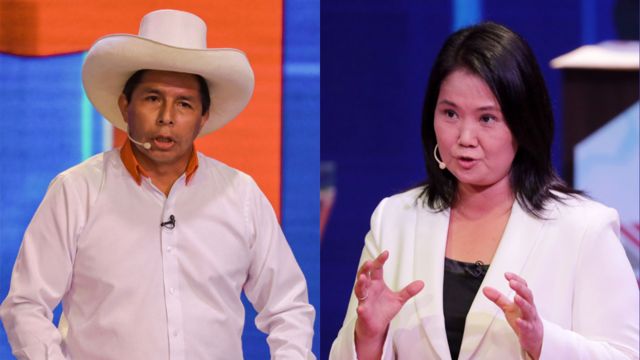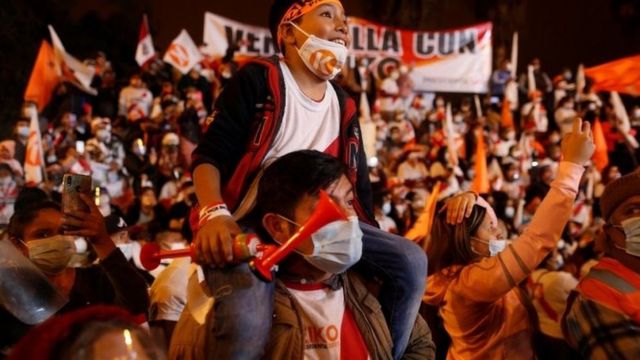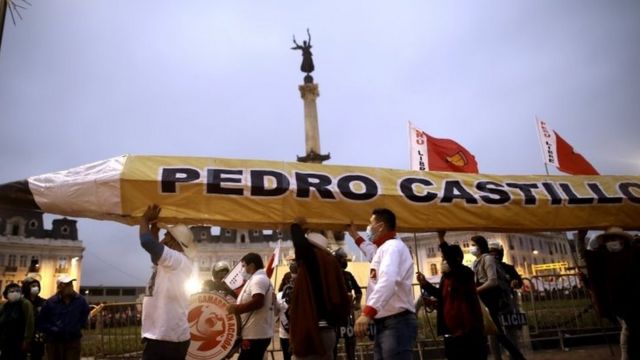Historic election in Peru is marked by candidates with high rejection and opposing views
Pedro Castillo and Keiko Fujimori face off this Sunday, in Peru's second round of elections
Peruvian voters vote, this Sunday (6/13), in the second round of the presidential election between two completely opposite candidates, who represent, on the one hand, traditional populist politics and, on the other, the promise of a total change in the current system. in the country.
Due to the extremely adverse profiles of candidate Keiko Fujimori, from Fuerza Popular (Popular Force), and Pedro Castillo, from Peru Libre (Free Peru), the vote is being called "historic" among Peruvian analysts and voters, in the midst of a crisis policy and health that is unprecedented.
A candidate for the third time, Keiko is an old acquaintance of the Peruvians, both because of her own trajectory - she was even arrested on charges of having received US$ 1.2 million illegally from the Brazilian contractor Odebrecht in Peru - and because of the fact that she is the former's daughter. -President Alberto Fujimori (1990-2000), currently imprisoned for human rights abuses.
Keiko defends the maintenance of current economic rules, such as free trade and measures that facilitate foreign investment, including mining, one of the targets in her opponent's nationalization plans - whom she often refers to as a representative of "communism".
"Keiko's problem is the luggage she carries, one of her father and one of herself," political analyst Fernando Tuesta told Reuters.
For her and for her voters, however, the Castillo opponent represents "unpredictability".
As for Castillo's supporters, he symbolizes the hope of "inclusion" in a country with its economic bases on track, but which, despite the numbers, has not brought the welfare state to everyone.
Supporters at Keiko Fujimori rally; candidate has already been arrested on suspicion of corruption and represents continuity of the current economic model
Pedro Castillo, the outsider
Castillo is something of an "outsider" of Peruvian politics, defined as a "Marxist left", who admires former Venezuelan president Hugo Chávez and his successor, Nicolás Maduro - to "despair", say sources, investors and the middle classes and the wealthy ones who "fear" for their money.
Elementary school teacher, Castillo, 51, is the big surprise in the electoral dispute.
With his straw hat, mounted on a horse and sporting a pencil, he symbolizes the vote of those who feel they have not been included in the economic boom experienced by the country in recent decades.
He usually says that he wants the "State in people's lives" and ends his speeches with his emblematic "maestro's word" ('teacher's word').
In recent days, Castillo has sparked controversy by saying that "feminicides are the result of idleness." After being criticized, she affirmed that the crimes of death against women are due to the State's inaction.
The candidate is interpreted as "a nationalist in the economic sphere and a conservative in the social".
Peru is one of the countries with the highest rates of Catholics in Latin America and where the debate on the inclusion of LGBTI is still far off compared to other countries in the region such as Argentina and Uruguay, for example.
Castillo rejects the gay community, but has the support of the country's iconic leftist politician, Verónica Mendoza, who has the sympathy of the urban vote and is in favor of the LGBTI community.
"I think the only coincidence between Keiko and Castillo is that the two only recognize two sexes, male and female," noted Peruvian analyst Carlos Aquino of the National Major University of San Marcos in Lima. The two also acted in a similar way by not respecting the appeals of the government of current president Francisco Sagasti not to provoke crowds, which ended up occurring on the last day of the electoral campaign, on Thursday night, three days before the vote.
Supporters of Pedro Castillo, outsider of Peruvian politics, defined as Marxist left
High rejection and social conservatism
In both cases, say analysts and observers consulted by BBC News Brasil, the rejection registered by the candidates is high, fueling the polarization identified as "unprecedented" in the country that has seen the fall in series of presidents in recent years, accused of corruption.
"Keiko made a campaign with more concrete proposals for different sectors and spoke a lot to women. But she has a high anti-vote, partly for herself and partly for the Fujimorism she symbolizes," said analyst Alfredo Torres, president of Ipsos Peru.
About Castillo, the analyst defined him as follows: "Castillo made mistakes, such as sexist statements about femicide, and proposals that showed inconsistency. But he has the support of voters who are from rural regions and who, despite living in the capital, maintain the culture popular Andean and identify with it". In a speech on Friday (4), just before the vote, President Sagasti called for candidates to "scrupulously" respect Sunday's result.
Pandemic
The election will be held just days after the government acknowledged that the number of deaths per covid-19 is more than double the 70,000 it had previously reported.
The country of nearly 33 million people has officially registered 180,000 deaths from the disease so far - this is the highest rate in the world of deaths per million inhabitants, according to the platform Our World in Data, from the University of Oxford.
The coronavirus pandemic highlighted the problems faced by Peruvians, such as the lack of oxygen in hospitals, which cause queues for cylinders in the parallel market , and, in the educational sphere, the lack of internet access so that children from the countryside can study outside the schools.
The pandemic also showed that the absence of policies aimed at around 70% of Peruvians who work as informal people made many of them fail to comply with the "stay at home" guideline to protect themselves from the virus.
Queues for refueling oxygen balloons in Lima, the Peruvian capital, in photo from July 2020; country already has 180,000 dead by covid-19
In the first year of the pandemic, in 2020, the country's Gross Domestic Product (GDP) registered a drop of almost 13%, the worst in South America. And despite the forecast of strong recovery this year - attributed to its economic pillars, such as low inflation and reserves at the Central Bank - social exclusion has been aggravated in these pandemic months.
To the health and economic problems is added the political upheaval. Last November, amid impeachment processes, protests and resignations, Peru had three presidents within a week .
"Tiredness"
In this context, a large sector of the population of inhabitants seems to show "tiredness" with the policies in force in the country, which contributed to Castillo reaching the second round of the election.
"In the poorest regions, many identify with him. They think: 'he's like me, he understands my problems,'" said an observer who follows the political bowels of the country.
Torres, from Ipsos Peru, recalls that the leftist candidate usually says that Peru is a rich country, with poor people. "He says 'no more poor people in a rich country, a professor's word.' But he has already changed teams several times and it is not clear how he will fulfill his promises," said Torres.
The analyst notes that the country has had highly contested elections in the past, but none with candidates "so extremely different".
Aquino, an economist, professor at San Marcos University, said, in turn, that what is clear, in the economic sphere, is that if Keiko is elected, the country will go "good or bad, more or less the same as now", but that "it is not entirely clear what will happen if Castillo is elected".
In an environment of polarization, rejection, rumors, Peruvians were surprised and shocked by an attack that left 14 dead last month and was attributed to the extremist group Sendero Luminoso - one of the main targets of Fujimorism politics in the 1990s.
Keiko sought to associate the attack with politicians linked to the opposition. "Today, more than ever, we must defend our homeland and vote very calmly on June 6 (election day)," he said.
Castillo, in turn, disapproved of what he called a "wild attack" and asked for the "weight of the law".
Opinion polls point to a technical tie between the two candidates, who will have to compete in the vote by vote and who do not have a majority in Congress either.




No comments:
Post a Comment